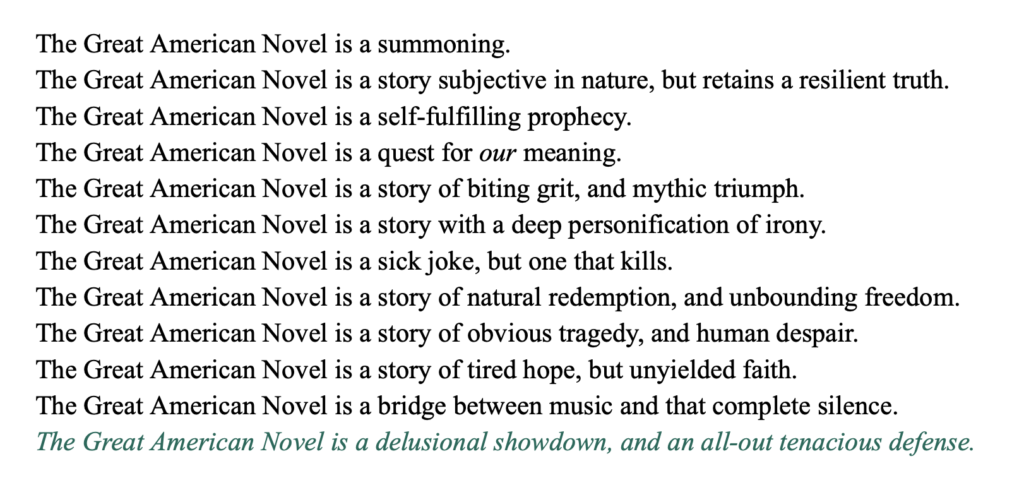The Great American Novel is a meta-modern tale!
You may be familiar with the movements, modernism and postmodernism. Well I believe the two schools of thought play a role in a new way to consider and conceptualize The Great American Novel.
Modernism vs. Postmodernism
Here are some of the characteristics I typically consider when I try to understand the aspects that differentiate the two movements.
Modernism
- Late 19th century, and early 20th century
- Solutions to old problems were made through science, technological advancements and industrialization
- Societal values revolved around progression through human reason. Era marked by logical, analytical, and rational thought
- Sought to construct solutions and effect change in all aspects of life
- Emphasis on form, function, and interior value
- Idealistic or in search of truth
- Literature – strayed from conventional styles, stream of consciousness, escapism, closed or coherent narratives with one definite meaning
Postmodernism
- Mid to late 20th century, and early 21st century
- Direct result of modernism but inherently contrasts preceding movement, general cultural views began to shift or were deconstructed and challenged
- Newer problems to face with need for much more complex solutions – Second World War, challenges of globalization and urbanization
- Newer technologies with adverse effects – mass media and consumerism
- Emphasis on “the idea” and exterior value
- Societal Emotional, subjective and irrational thought
- Disillusioned or apathetic-there is no truth
- Literature – Irony, parodying of conventional styles, blending of styles, paradoxes, open or chaotic but overall more intertextual narratives
There are some arguing a new movement is unfolding called metamodernism, and I agree. Here are some of the general characteristics I believe make up the metamodernist movement.
Metamodernism
- Fluidity between modernism and postmodernism
- Sincere Irony
- Understanding different frames of reference and their juxtaposition to each other
- Simultaneity
- Collaboration
- Lack of aesthetic distance from new modes of communication
- Metanarratives – emphasis on both exterior and interior, or idea and form/function
I simply understand metamodernism as a synthesis of its two predecessors-that simple vision of synthesization is what I plan to be the very backbone to this endeavor. I know the idea of someone, some unknown writer declaring an open challenge for The Great American Novel is ludicrous but I’m simply trying to combine the two schools of thought. I believe creating a foundation built on one challenging all for The Great American Novel can really create something different within the American literary landscape.
Let me explain – By nature, me unironically challenging all of you for The Great American Novel is an attempt to deconstruct our collective understanding of the idea.
But it would be careless of me to simply challenge all for the subjective title The Great American Novel. That would be a divisive poison to all of my work, written or oratory rhetoric. At that point, I’d be employing the tactics of a demagogue telling a story founded on the diminishment of others. It cannot, and will never be my objective. Actually, it’s quite the opposite. Hopefully, by now you know that I believe unification is inherent to the very nature of The Great American Novel. I want to work together with you, to create a story that is great because of us. But to create the story I envision, the way I see it- modernist and postmodernist views must be synthesized. I plan to achieve the idea in its totality, with reverse and forward engineering, inside and out. I will continually deconstruct the actual idea of The Great American Novel while simultaneously reconstructing it.
Example
I’ve shared a few posts on the ADR page that look like this.

The significance of these simple sentences tie into the metacognitive functions I believe are increasingly more critical in understanding stories. I really do believe The Great American Novel is self-reflexive and somewhat of a self-fulfilling prophecy. The primary reason I share this with you is to create a self-reflexive story for The Dream Series to parallel the idea of The Great American Novel. The descriptions I provide for The Great American Novel aren’t simply about how I view the idea, they also convey my understanding of the idea’s mythos, and the cultural impact of different works of the American literary canon as whole.
The other reason is of course connected with your involvement in the story. These descriptions are how I will work to reconstruct and expand on the idea after challenging you for it. This is why I require you, I am displacing previous conceptions of The Great American Novel with my own. I challenge you for The Great American Novel, challenging how you come to the very conclusion, but my plan is not to inspire division. I’m not asking for you to believe or validate me. I need your help to confirm whether or not I was truthful in my presumptions. You will be able to look back and see for yourself if there was any veracity to my words.
Remember, there is a larger overarching theme to this story – my ambition to achieve The Great American Novel and providing what I believe will constitute as the GAN- a parallel to the idea itself The Dream Series. The lines between show and tell in conventional storytelling have already become blurred, I’m simply following suit. I’m telling you what I believe The Great American Novel to be, but also sharing insight into what the stories of The Dream Series will be as I write and publish them. The different posts I share describing what I personally believe to be are not just my vision, or my way of conveying the self-reflexive and referential nature of the GAN, the descriptions should also work as canonical points of reference for the efficacy of The Dream Series as it is completed.
The simple truth is, I can only really write a story I believe contends for the title, and hope you see what I mean. I can’t promise you The Great American Novel in true actuality. Honestly, the whole point is that it’s subjective, and any effort on my part to do so would probably make me a much more unreliable narrator. But, there is something I can promise you. When The Dream Series is completed, when there are no more words left for me to write, when the story’s been told, and our journey together comes to an end, you will never consider The Great American Novel, from its nature as an idea, its mythos, and the canon of actual texts in the same way we once did.
